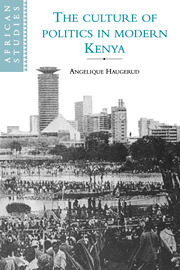Book contents
- Frontmatter
- Contents
- List of maps
- List of tables
- Preface
- 1 Introduction: staging politics in Kenya
- 2 Shattered silences: political culture and “democracy” in the early 1990s
- 3 Open secrets: everyday forms of domination before 1990
- 4 Moral economy and the quest for wealth in central Kenya since the late nineteenth century
- 5 The dove and the castor nut: Embu household economy in the 1980s
- 6 Conclusions: the showpiece of an hour
- Notes
- Bibliography
- Index
- Titles in the series
Preface
Published online by Cambridge University Press: 05 June 2012
- Frontmatter
- Contents
- List of maps
- List of tables
- Preface
- 1 Introduction: staging politics in Kenya
- 2 Shattered silences: political culture and “democracy” in the early 1990s
- 3 Open secrets: everyday forms of domination before 1990
- 4 Moral economy and the quest for wealth in central Kenya since the late nineteenth century
- 5 The dove and the castor nut: Embu household economy in the 1980s
- 6 Conclusions: the showpiece of an hour
- Notes
- Bibliography
- Index
- Titles in the series
Summary
This book began as a brief diversion from my prior focus on social and economic change in the Kenyan countryside. The global and African political upheavals of the early 1990s drew my attention to Kenya's vigorous new political contests, and to the heterodox political voices that now stormed the public domain – through popular music, theatre, sermons, court battles by human rights lawyers, and politicians' speeches. This recent tumult is not the central focus of this work, though it is the theme of chapter 2, and it inevitably affects readings of earlier processes of social change. The shifting political winds of the 1990s caught my attention as I was taking a new look at inventions of national political culture in earlier times, in an effort to connect rural livelihood struggles to the spectacle or staging of politics, especially as it occurred through public gatherings or baraza. I attended many of these political rituals while doing field research in rural Embu District, though at the time I did not imagine them to be particularly central to my work. They have turned out to be so, for reasons discussed in chapter 1. As I note there, though baraza are not the exclusive focus of this study, I take them as a revealing point of entry into the cross-currents of Kenyan life. From that entry point, I adopt a shifting angle of vision that captures interpenetrating domains of the local, the national, and the international.
- Type
- Chapter
- Information
- The Culture of Politics in Modern Kenya , pp. xi - xviPublisher: Cambridge University PressPrint publication year: 1995

